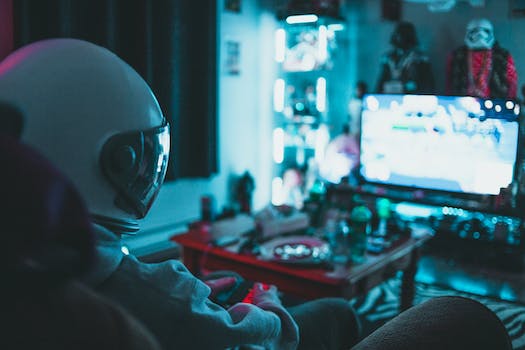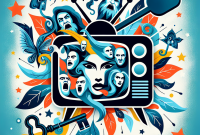
The Evolution of Reality TV: How Unscripted Shows Have Transformed
-
Table of Contents
- Introduction
- The Impact of Reality TV on Society: How Unscripted Shows Have Changed the Way We View the World
- The Rise of the Reality TV Star: How Unscripted Shows Have Created a New Breed of Celebrity
- The Evolution of Reality TV Genres: How Unscripted Shows Have Adapted to Changing Audiences
- The Power of Reality TV: How Unscripted Shows Have Influenced Pop Culture
- The Future of Reality TV: How Unscripted Shows Will Continue to Evolve in the Digital Age
- Q&A
- Conclusion
Popular Culture
“From Candid Camera to Keeping Up with the Kardashians: The Evolution of Reality TV and Its Impact on Popular Culture”
Introduction
Popular Culture
Reality television has become a major part of popular culture in the last two decades. From the early days of shows like Survivor and Big Brother to the more recent hits like Keeping Up with the Kardashians and The Bachelor, reality TV has had a huge impact on how we view and interact with the world around us. This article will explore the evolution of reality TV and how it has transformed popular culture. We will look at the different types of reality TV, the impact it has had on our society, and the future of the genre.
The Impact of Reality TV on Society: How Unscripted Shows Have Changed the Way We View the World
Reality television has become a major part of our culture in the past two decades. Unscripted shows have become a staple of our entertainment diet, and they have had a profound impact on the way we view the world.
Reality TV has changed the way we view celebrities. Before the advent of reality TV, celebrities were seen as larger-than-life figures who lived in a world far removed from our own. But reality TV has allowed us to get an intimate look at the lives of celebrities, and it has made them more relatable and accessible. We now have a better understanding of their struggles and triumphs, and we can relate to them in a way that was not possible before.
Reality TV has also changed the way we view everyday people. We now have a better understanding of the lives of people from all walks of life. We can see how they live, how they interact with each other, and how they handle difficult situations. This has allowed us to gain a better understanding of different cultures and lifestyles, and it has helped to break down barriers between people.
Reality TV has also changed the way we view ourselves. We now have a better understanding of our own strengths and weaknesses, and we can use this knowledge to make better decisions in our own lives. We can also use reality TV as a source of inspiration, as we can see how people have overcome their own struggles and achieved success.
Finally, reality TV has changed the way we view the world. We now have a better understanding of global issues, and we can see how different cultures and societies interact with each other. This has allowed us to gain a better understanding of the world around us, and it has helped to create a more tolerant and accepting society.
Overall, reality TV has had a profound impact on the way we view the world. It has allowed us to gain a better understanding of different cultures and lifestyles, and it has helped to break down barriers between people. It has also allowed us to gain a better understanding of our own strengths and weaknesses, and it has provided us with a source of inspiration. Finally, it has allowed us to gain a better understanding of global issues, and it has helped to create a more tolerant and accepting society.
The Rise of the Reality TV Star: How Unscripted Shows Have Created a New Breed of Celebrity
In the past decade, reality television has become a major force in the entertainment industry. From cooking competitions to dating shows, these unscripted programs have captivated audiences around the world and created a new breed of celebrity.
Reality TV stars are often seen as the antithesis of traditional Hollywood celebrities. They are not actors or musicians, but everyday people who have been thrust into the spotlight. They are often seen as more relatable and accessible than their scripted counterparts, and their fame is often based on their personalities and the drama they bring to the show.
The rise of reality TV has also changed the way we view celebrity. These stars are often seen as more authentic and genuine than traditional celebrities, and their fame is often based on their ability to be entertaining and engaging. They are also seen as more accessible, as they often interact with their fans on social media and other platforms.
Reality TV stars have also become a major influence in the fashion and beauty industries. Many of these stars have become fashion icons, and their style choices are often emulated by their fans. They have also become major influencers in the beauty industry, with many launching their own makeup and skincare lines.
The rise of reality TV has also had a major impact on the entertainment industry. These shows have become a major source of revenue for networks, and they have also created a new type of celebrity. Reality TV stars are often seen as more relatable and accessible than traditional celebrities, and their fame is often based on their personalities and the drama they bring to the show.
Reality TV has changed the way we view celebrity, and it has created a new breed of star. These stars are often seen as more authentic and genuine than traditional celebrities, and their fame is often based on their ability to be entertaining and engaging. They are also seen as more accessible, as they often interact with their fans on social media and other platforms. Reality TV stars have become a major influence in the fashion and beauty industries, and they have also become a major source of revenue for networks.
The Evolution of Reality TV Genres: How Unscripted Shows Have Adapted to Changing Audiences

Reality television has come a long way since its inception in the early 2000s. From the early days of unscripted shows like Survivor and Big Brother to the more recent iterations of the genre, reality TV has evolved to meet the changing needs of its audience.
In the early days of reality TV, the focus was on competition and drama. Shows like Survivor and Big Brother pitted contestants against each other in a battle for a grand prize. These shows were often filled with intense competition and drama, as contestants fought for the top spot.
However, as the genre has evolved, so too have the types of shows that are being produced. Today, reality TV has become much more diverse, with shows that focus on different aspects of life. From cooking competitions to home renovation shows, there is something for everyone.
In addition to the variety of genres, reality TV has also become more inclusive. Shows like Queer Eye and RuPaul’s Drag Race have become popular for their focus on diversity and inclusion. These shows have helped to create a more accepting and understanding environment for viewers of all backgrounds.
Finally, reality TV has also become more interactive. With the rise of social media, viewers are now able to interact with their favorite shows in real time. This has allowed viewers to become more involved in the show, as they can comment on the action and even influence the outcome of certain events.
Overall, reality TV has come a long way since its inception. From the early days of competition and drama to the more inclusive and interactive shows of today, reality TV has adapted to meet the changing needs of its audience. As the genre continues to evolve, it will be interesting to see what new and exciting shows will be produced in the future.
The Power of Reality TV: How Unscripted Shows Have Influenced Pop Culture
Reality television has become a major force in pop culture over the past two decades. From the early days of MTV’s The Real World to the current slate of shows on cable and streaming services, unscripted programming has had a profound impact on the way we view the world.
The success of reality TV can be attributed to its ability to capture the drama and excitement of real life. Unlike scripted shows, which rely on actors and writers to create a narrative, reality TV relies on the unpredictable nature of everyday life. This has allowed viewers to connect with the characters in a way that is not possible with scripted shows.
Reality TV has also had a major influence on the way we view celebrities. Many of today’s biggest stars got their start on reality TV shows, from Kim Kardashian to the cast of Jersey Shore. These shows have allowed viewers to get to know these celebrities in a way that was not possible before.
Reality TV has also had an impact on the way we consume media. Many of today’s most popular shows are based on the format of reality TV, from cooking competitions to dating shows. This has allowed viewers to engage with content in a way that was not possible before.
Finally, reality TV has had a major influence on the way we view ourselves. Many of today’s shows focus on real people and their struggles, allowing viewers to relate to the characters in a way that is not possible with scripted shows. This has allowed viewers to gain a better understanding of themselves and the world around them.
It is clear that reality TV has had a major impact on pop culture. From its ability to capture the drama and excitement of real life to its influence on the way we view celebrities and ourselves, unscripted programming has changed the way we view the world.
The Future of Reality TV: How Unscripted Shows Will Continue to Evolve in the Digital Age
As the digital age continues to evolve, so too does the world of reality television. Unscripted shows have become a staple of the entertainment industry, and they’re only getting more popular. With the rise of streaming services, reality TV has become more accessible than ever before, and it’s only going to continue to grow.
The future of reality TV is likely to be shaped by the ever-changing digital landscape. As technology advances, so too will the way we consume content. We’re already seeing the rise of interactive and immersive experiences, such as virtual reality and augmented reality. These technologies could be used to create new and exciting ways to experience reality TV.
We’re also likely to see an increase in the use of social media in reality TV. Social media has become an integral part of our lives, and it’s only natural that it will be used to enhance the viewing experience. We’ve already seen shows like Big Brother and The Voice use social media to engage with viewers and create a more interactive experience.
Finally, we’re likely to see an increase in the use of data and analytics in reality TV. Data can be used to track viewer engagement and help producers create more engaging content. It can also be used to create more personalized experiences for viewers, allowing them to customize their viewing experience.
The future of reality TV is sure to be an exciting one. As technology continues to evolve, so too will the way we consume content. We’re likely to see an increase in interactive and immersive experiences, as well as the use of social media and data to create more personalized experiences. It’s an exciting time for reality TV, and we can’t wait to see what the future holds.
Q&A
Popular Culture
1. What is reality TV?
Reality TV is a genre of television programming that documents unscripted situations and real-life stories, usually featuring ordinary people instead of professional actors.
2. How has reality TV evolved over the years?
Reality TV has evolved from its early days of low-budget, voyeuristic shows to more sophisticated, high-budget productions that feature a variety of genres, including competition, dating, makeover, and lifestyle shows.
3. What impact has reality TV had on popular culture?
Reality TV has had a significant impact on popular culture, from influencing fashion trends to creating celebrities out of ordinary people. It has also changed the way people view and interact with television, as viewers are now more likely to engage with the content and participate in conversations about it.
4. What are some of the most popular reality TV shows?
Some of the most popular reality TV shows include The Bachelor, Survivor, Big Brother, The Voice, and Keeping Up with the Kardashians.
5. What are some of the criticisms of reality TV?
Critics of reality TV argue that it is often scripted and edited to create drama and sensationalism, and that it can be exploitative of its participants. Additionally, some argue that it perpetuates negative stereotypes and encourages viewers to judge and criticize the participants.
Conclusion
Popular Culture
The Evolution of Reality TV has had a profound impact on popular culture. It has changed the way people view television, and it has opened up a new world of entertainment. Reality TV has become a major part of the television landscape, and it has allowed viewers to experience a variety of different stories and perspectives. It has also provided a platform for people to express themselves and to share their stories with the world. Reality TV has become an important part of our culture, and it will continue to shape the way we view television for years to come.






